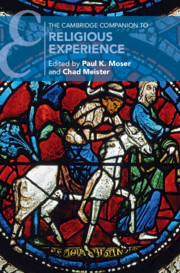Book contents
- The Cambridge Companion to Religious Experience
- Cambridge Companions to Religion
- The Cambridge Companion to Religious Experience
- Copyright page
- Contents
- Figures
- Contributors
- Preface
- Introduction
- Part I Characterizing Religious Experience
- Part II Religious Experience in Traditional Monotheism
- Part III Religious Experience Outside Traditional Monotheism
- 7 Religious Experience in Ancient Confucianism and Daoism
- 8 Religious Experience in Buddhism
- 9 Rāmānuja’s Eleventh Century Hindu Theology of Religious Experience
- Part IV Prominent Themes and Challenges
- Index
- Cambridge Companions to Religion
- References
8 - Religious Experience in Buddhism
from Part III - Religious Experience Outside Traditional Monotheism
Published online by Cambridge University Press: 20 June 2020
- The Cambridge Companion to Religious Experience
- Cambridge Companions to Religion
- The Cambridge Companion to Religious Experience
- Copyright page
- Contents
- Figures
- Contributors
- Preface
- Introduction
- Part I Characterizing Religious Experience
- Part II Religious Experience in Traditional Monotheism
- Part III Religious Experience Outside Traditional Monotheism
- 7 Religious Experience in Ancient Confucianism and Daoism
- 8 Religious Experience in Buddhism
- 9 Rāmānuja’s Eleventh Century Hindu Theology of Religious Experience
- Part IV Prominent Themes and Challenges
- Index
- Cambridge Companions to Religion
- References
Summary
Burton highlights the complexity of Buddhist attitudes to religious experience, thus challenging a western overemphasis on the role of personal experience and subjective factors in Buddhist religious experience, to the neglect of such social factors as rituals and scriptural components. He considers whether the Buddhist doctrine of no enduring, unchanging self can be justified by introspective experience, and he observes that this is a matter of controversy among Buddhist scholars.
- Type
- Chapter
- Information
- The Cambridge Companion to Religious Experience , pp. 187 - 207Publisher: Cambridge University PressPrint publication year: 2020
References
- 1
- Cited by

